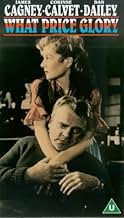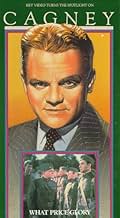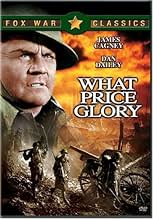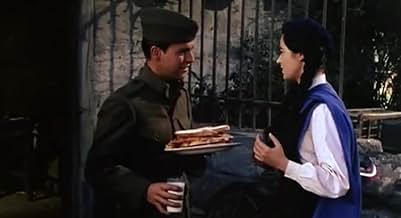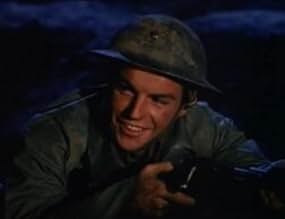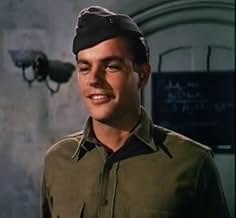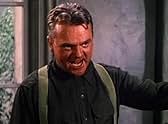AVALIAÇÃO DA IMDb
6,1/10
1,5 mil
SUA AVALIAÇÃO
Adicionar um enredo no seu idiomaThe wartime romantic misadventures of Captain Flagg, commander of a company of US Marines in 1918 France.The wartime romantic misadventures of Captain Flagg, commander of a company of US Marines in 1918 France.The wartime romantic misadventures of Captain Flagg, commander of a company of US Marines in 1918 France.
- Direção
- Roteiristas
- Artistas
Max Showalter
- Lt. Moore
- (as Casey Adams)
Luis Alberni
- Grand Uncle
- (não creditado)
Olga Andre
- Sister Clothilde
- (não creditado)
Tina Blagoi
- Mrs. Bouchard
- (não creditado)
Danny Borzage
- Gilbert
- (não creditado)
George Bruggeman
- German Lieutenant
- (não creditado)
Frederic Brunn
- German Officer
- (não creditado)
Paul Bryar
- Charmaine's Uncle
- (não creditado)
Avaliações em destaque
This patriotic war film is the bees knees for slap stick, witty comedy. The mixture of wussy brown nosing privates and annoyed sarcastic generals provides a hilarious bitter sweet feeling that can put a smile on your face. Not to mention the constant friendly rivalry between the comedic loud mouthed Captain Flagg (Cagney being Cagney), and the irritated Sergeant Quirt played by Dailey, for the cute and innocent French waitress Charmaine. This movie not only made a great world war 1 film, but proved Cagney was still his energetic, pound for pound, hard nosed self even at 53 years old. The only downside to the movie was the poorly portrayed dramatic war speeches and the failed attempts at giving a life lesson. But all around 8/10
One of the great anti-war plays of the 1920s was Maxwell Anderson's What Price Glory. The play expressed popular American feeling that we were never going to war again like that and endure the slaughter in those trenches in France that occurred in the short time we were there. Remember we only declared war in 1917 and the thing had been going on in Europe for three years by the time we got there.
One of the things Woodrow Wilson as President and the American Expeditionary Force commander John Pershing insisted on was that the American army when fully trained would fight as a unit and not just be replacement troops for the French and British already there. They deviated only once from that policy when the American First Marine Division became the first American troops in battle in World War I at Belleau Wood. These Marines depicted here are part of those troops.
John Ford is one of our great American directors and when he does his own work on material never before used he's produced some remarkable cinema. But here he takes a serious anti-war play and turns it into one of his service comedies. There certainly are comedic elements in What Price Glory, but it's a serious picture.
The original silent film version done by Raoul Walsh was faithful to Maxwell Anderson's spirit and introduced those two Marines Edmund Lowe and Victor McLaglen who were so popular as Captain Flagg and Sergeant Quirt that they went and starred in a slew of buddy films. In fact they and James Cagney and Pat O'Brien introduced and popularized the buddy film genre.
Cagney steps into McLaglen shoes here and Dan Dailey plays Sergeant Quirt. They played two belligerent oafs in this and play them well, but no one ever thought of re-teaming them.
John Ford should have let this classic alone.
One of the things Woodrow Wilson as President and the American Expeditionary Force commander John Pershing insisted on was that the American army when fully trained would fight as a unit and not just be replacement troops for the French and British already there. They deviated only once from that policy when the American First Marine Division became the first American troops in battle in World War I at Belleau Wood. These Marines depicted here are part of those troops.
John Ford is one of our great American directors and when he does his own work on material never before used he's produced some remarkable cinema. But here he takes a serious anti-war play and turns it into one of his service comedies. There certainly are comedic elements in What Price Glory, but it's a serious picture.
The original silent film version done by Raoul Walsh was faithful to Maxwell Anderson's spirit and introduced those two Marines Edmund Lowe and Victor McLaglen who were so popular as Captain Flagg and Sergeant Quirt that they went and starred in a slew of buddy films. In fact they and James Cagney and Pat O'Brien introduced and popularized the buddy film genre.
Cagney steps into McLaglen shoes here and Dan Dailey plays Sergeant Quirt. They played two belligerent oafs in this and play them well, but no one ever thought of re-teaming them.
John Ford should have let this classic alone.
So much has been said in the reviews to date that none of it bears repeating, but there are a couple of points one should be aware of before investing 1hr 45min into this movie. Though filmed in 1952, the style has the feel of a movie from the late 30's/early 40's with the slapstick violence, goofy foreigners, and hammy acting. I expect and tolerate these things from pre-WWII flicks, but is hard to take from something produced in the 1950's.
As far as the anti-war element goes, this version is more of a tragic story of war than a pacifist piece. No pacifist here, but if you are looking for this from What Price Glory you'll be disappointed.
As far as the anti-war element goes, this version is more of a tragic story of war than a pacifist piece. No pacifist here, but if you are looking for this from What Price Glory you'll be disappointed.
In the mid-1920s, when What Price Glory? debuted as a play and was filmed for the first time, there was a popular anti-war mood, and cultural works attacking the First World War proliferated. In the early-1950s, with World War Two a recent memory and the Korean war still going on, war movies of every kind were at the height of their popularity, but there was no way they could be openly anti-militaristic. Hence, when Fox Studios decided to resurrect the classic story in 1952 it was largely a comical and de-politicised affair.
With a screenplay by Henry and Phoebe Ephron, this version of What Price Glory? uses virtually none of Maxwell Anderson's original dialogue. The job of direction was handed to John Ford, who was known for staging extended improvisations, creating little vignettes of military life with comical drunkenness and good-natured fistfights. In What Price Glory? this is done to the extent that it actually overshadows any semblance of plot. And not just the anti-war business; the romantic subplots seem weak and disjointed as well.
That's not to say there aren't some good things about this picture. The Technicolor cinematography by Joe MacDonald is often breathtaking, giving a haunting quality to the mist-shrouded battlegrounds. Ford was as always a good visual director, often using stark contrasts in depth to bring different ideas to our attention in the one shot. For example, as the troops march off to the front, a mass of drab browns and greys, we see Corinne Calvet in a bold red, white and blue dress – a human flag and a reminder of what the men are leaving behind them. And James Cagney is good fun in one of his purely comic roles.
But there is little else to recommend about this What Price Glory? Various scenes look to have been filmed with an emphasis on pathos, but they don't work within the structure of the whole thing. When a young Robert Wagner makes the central speech in which the words of the title are spoken, it seems barely to relate to the rest of the picture. And it's not the mixing of comedy with the realities of war per se that makes it fall apart – after all this is the basis of such classics as The Big Parade and MASH – it's just that the balance is wrong. It simply fails to take the war seriously enough, and the "serious" moments seem like flimsy little inserts. Of course, if it had been a tight and hard-hitting anti-war drama, it would most likely have fallen foul of the censors and/or stifled the careers of its creative team. As it was, this vague mish-mash of bar songs and army jokes was conveniently inoffensive.
With a screenplay by Henry and Phoebe Ephron, this version of What Price Glory? uses virtually none of Maxwell Anderson's original dialogue. The job of direction was handed to John Ford, who was known for staging extended improvisations, creating little vignettes of military life with comical drunkenness and good-natured fistfights. In What Price Glory? this is done to the extent that it actually overshadows any semblance of plot. And not just the anti-war business; the romantic subplots seem weak and disjointed as well.
That's not to say there aren't some good things about this picture. The Technicolor cinematography by Joe MacDonald is often breathtaking, giving a haunting quality to the mist-shrouded battlegrounds. Ford was as always a good visual director, often using stark contrasts in depth to bring different ideas to our attention in the one shot. For example, as the troops march off to the front, a mass of drab browns and greys, we see Corinne Calvet in a bold red, white and blue dress – a human flag and a reminder of what the men are leaving behind them. And James Cagney is good fun in one of his purely comic roles.
But there is little else to recommend about this What Price Glory? Various scenes look to have been filmed with an emphasis on pathos, but they don't work within the structure of the whole thing. When a young Robert Wagner makes the central speech in which the words of the title are spoken, it seems barely to relate to the rest of the picture. And it's not the mixing of comedy with the realities of war per se that makes it fall apart – after all this is the basis of such classics as The Big Parade and MASH – it's just that the balance is wrong. It simply fails to take the war seriously enough, and the "serious" moments seem like flimsy little inserts. Of course, if it had been a tight and hard-hitting anti-war drama, it would most likely have fallen foul of the censors and/or stifled the careers of its creative team. As it was, this vague mish-mash of bar songs and army jokes was conveniently inoffensive.
Well, despite having made "The Sands of Iwo Jima", John Ford made a movie about World War I Marines that doesn't really seem to be about Marines at all. I'm not a student of World War I Marine slang, but it seemed odd for Captain Flagg to pronounce Sergeant Quirt his "Top Soldier" and for Marines to refer to each other as soldiers. Despite the fact that they under French command, I found it odd for them to refer to being in the Army, since they are in the Corps. Go figure.
The two combat scenes are amateurish, even by Ford's standards. The acting is not convincing (except when Robert Wagner dies and Cagney manages not to over-act it) and while you can believe the two main characters don't like each other at the beginning, you never believe there's some odd tie binding them together. The character development is relatively tame, with only Wagner and Harry Morgan (Colonel Potter as a Marine Corporal and quartermaster!) showing any depth among the minor Marine characters.
Dan Dailey does play a convincing loud, parade ground senior NCO. He conveys the conniving and womanizing well, but when he is supposed to have finally fallen for the French beauty, it's hard to believe. Cagney plays merely a caricature of the hard-bitten, seen-it-all Marine. His final scene neither convinces you he considers staying or that the Corps means so much to him that he has to go.
The worst part is when a wounded Marine shouts out the title of the movie. It's something along the lines of "Are you going to get in the game, Captain? There's two minutes left and we need a hero. What price glory, Captain? What price glory?" One can imagine that delivered stirringly by a character whose motivation we understand, but instead, it is shouted by a nameless face with only a crazed look. It also would help if the Captain had been portrayed as a glory hound instead of drunken, war-weary yet sympathetic. I guess they had to get the name of the movie in somehow....
I was trying to imagine John Ford's World War I and was sadly disappointed that it wasn't more moving.
The two combat scenes are amateurish, even by Ford's standards. The acting is not convincing (except when Robert Wagner dies and Cagney manages not to over-act it) and while you can believe the two main characters don't like each other at the beginning, you never believe there's some odd tie binding them together. The character development is relatively tame, with only Wagner and Harry Morgan (Colonel Potter as a Marine Corporal and quartermaster!) showing any depth among the minor Marine characters.
Dan Dailey does play a convincing loud, parade ground senior NCO. He conveys the conniving and womanizing well, but when he is supposed to have finally fallen for the French beauty, it's hard to believe. Cagney plays merely a caricature of the hard-bitten, seen-it-all Marine. His final scene neither convinces you he considers staying or that the Corps means so much to him that he has to go.
The worst part is when a wounded Marine shouts out the title of the movie. It's something along the lines of "Are you going to get in the game, Captain? There's two minutes left and we need a hero. What price glory, Captain? What price glory?" One can imagine that delivered stirringly by a character whose motivation we understand, but instead, it is shouted by a nameless face with only a crazed look. It also would help if the Captain had been portrayed as a glory hound instead of drunken, war-weary yet sympathetic. I guess they had to get the name of the movie in somehow....
I was trying to imagine John Ford's World War I and was sadly disappointed that it wasn't more moving.
Você sabia?
- CuriosidadesJohn Ford was an uncredited second unit director in the 1926 version directed by Raoul Walsh.
- Erros de gravaçãoCaptain Flagg's command was referred to as L Company, 5th Marines. In WWI Marine Companies were numbered. Prior to WWI they served independently with battalions and above were ad hoc organizations. 5th Marines should 5th Regiment. The change from Regiment to Marines wouldn't come until the 30s.
- Citações
Captain Flagg: It's a lousy war, kid... but it's the only one we've got.
- ConexõesFeatured in Jogo de Paixões (1970)
- Trilhas sonorasOui, Oui, Marie
(uncredited)
Music by Fred Fisher
Lyrics by Al Bryan and Joseph McCarthy
Sung by Corinne Calvet and chorus
Principais escolhas
Faça login para avaliar e ver a lista de recomendações personalizadas
- How long is What Price Glory?Fornecido pela Alexa
Detalhes
- Data de lançamento
- País de origem
- Idiomas
- Também conhecido como
- El precio de la gloria
- Locações de filme
- Marine Corps Base Camp Pendleton, Califórnia, EUA(army base scenes)
- Empresa de produção
- Consulte mais créditos da empresa na IMDbPro
- Tempo de duração
- 1 h 51 min(111 min)
- Proporção
- 1.37 : 1
Contribua para esta página
Sugerir uma alteração ou adicionar conteúdo ausente


